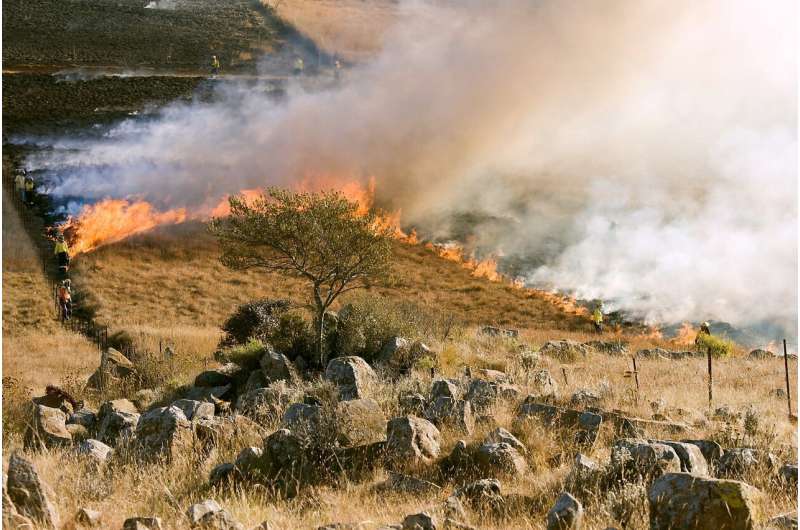This article has been reviewed according to Science X's editorial process and policies. Editors have highlighted the following attributes while ensuring the content's credibility:
fact-checked
peer-reviewed publication
trusted source
proofread
World's biggest study of wildfire smoke impact reveals alarming long-term health impacts

As North America recovers from some of the worst air quality in decades due to wildfires, one of the largest and most comprehensive studies into the long-term health impact of smoke exposure raises significant concerns about the long-term health impact of the Canadian wildfires.
The study found that a 10 μg/m3 increase of wildfire-related PM2.5 exposure was associated with a 0.4% higher risk of all-cause and nonaccidental mortality, and a 0.5% increase in risk of dying from neoplasms. On June 8, at the peak of the wildfire pollution, levels of PM2.5 reached 460 μg/m3
The research, led by researchers at Monash University in Australia and published in the Journal of Hazardous Materials, is the first to look at the relationship between long-term exposure, with a 11 years follow-up, to wildfire-related fine particulate matter (PM2.5) and mortality.
Importantly the study found no significant associations of wildfire-related PM2.5 exposure with mortality from cardiovascular, respiratory, and mental diseases.
To date, studies into the health impacts of wildfire-related PM2.5 exposure have shown an increased risk of all-cause, cardiovascular and respiratory mortality, however, according to lead researcher Associate Professor Shanshan Li, from the School of Public Health and Preventive Medicine, most of the evidence focused on short-term impacts. "We aimed to estimate the long-term impacts of wildfire-related PM2.5 exposure on mortality in adults using a large-scale national cohort database from the UK Biobank," she said.
"To the best of our knowledge, this is the first population-based prospective cohort study to quantify the associations between long-term exposure to wildfire-related PM2.5 and mortality."
The data came from a subset of the UK Biobank, involving 492,394 participants enrolled from 2004 to 2010, that are followed up regularly in the UK, collecting biological samples, surveys regarding lifestyle—all of which was then linked to their health-related records. The researchers then extracted mortality data, including underlying (primary) cause of death and date of death, which was mapped to wildfire-related PM2.5 exposure one to five years before death.
According to Associate Professor Li, the study's findings "show that wildfire-related PM2.5 exposure has long-lasting adverse impacts on all-cause, nonaccidental, and neoplasm mortality."
"Given the recent pollution levels in North America caused by the Canadian wildfires, our study linking long-term exposure to wildfire-related PM2.5 and mortality suggest that further research is urgently needed to provide more scientific evidence on this topic."
More information: Yuan Gao et al, Association between long-term exposure to wildfire-related PM2.5 and mortality: A longitudinal analysis of the UK Biobank, Journal of Hazardous Materials (2023). DOI: 10.1016/j.jhazmat.2023.131779




















